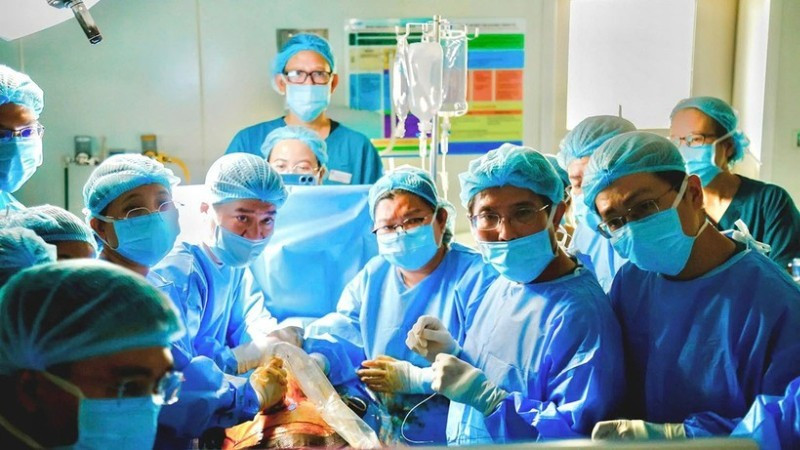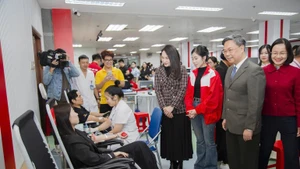These efforts are aimed at building a fair, high-quality, effective, and sustainable health system that does a good job of taking care of people’s health and integrating internationally.
New approach in health sector management
The draft Political Report of the 13th Party Central Committee assessed that people’s healthcare has developed positively, quality has been improved, epidemics have been well controlled, many advanced medical technologies and techniques have been mastered. However, health services still have many limitations, especially primary healthcare and preventive medicine. The limitations of people’s healthcare are pointed out as: The quality of health services is not uniform between regions; financial mechanisms and hospital autonomy policies still have many problems; overload situations at central hospitals still occur; and medical staff, especially at the grassroots level and in disadvantaged areas, is still lacking in terms of both quantity and quality. These limitations are bottlenecks that need to be resolved soon so that the health sector can develop rapidly and sustainably and integrate deeply with the world.
Health experts point out that, in the new development stage, the health system needs to perform well all three roles at the same time: being a solid pillar of social security and human development; being a reliable shield ensuring health security; and being a special service sector contributing to economic growth. The development of the health system needs to go hand in hand with the socio-economic development process.
First of all, the health system must be developed in line with the general socio-economic development of the country with specific goals by 2030 and 2045. In addition to actively and effectively contributing to the socio-economic development process, the health system also needs to spread, helping people enjoy the fruits of economic growth through quality healthcare services characterised by basic, essential social services, bringing direct and easily recognisable benefits.
In order to develop in an effective and sustainable manner in the future, in the context of many intertwined opportunities and challenges, the health system needs to identify and make good use of opportunities and effectively address the challenges of the external and internal environment that the health system is facing. In the new development stage, all basic components of the health system need to be innovated and continuously improved within a unified structural framework, ensuring effective interaction between these elements to optimise the desired overall impact.
The starting point has a decisive factor, which is to strongly innovate the thinking of health sector management, with a need to transform linear management thinking and experience-based management to management based on scientific evidence; as well as to improve transparency and accountability. Synchronously implement short-term as well as long-term solutions to resolve the situation.
Along with inheriting the orientation of equity, efficiency, quality and integration, the health system needs to gradually transform from a low-cost health system model (with wide coverage and low cost, but limited quality) to an effective health system model with reasonable costs (ensuring wide coverage and continuously improved quality with appropriate costs).
Health development is fundamental and long-term
In the context of many uncertainties in the world, when new epidemics, population aging and climate change simultaneously challenge the capacity of all health systems, Vietnam is choosing a fundamental and long-term development strategy. The draft documents submitted to the 14th National Congress clearly stated that, in building a fair, quality, effective and sustainable health system and effectively implementing the national target program on healthcare, population, and development, every citizen will have access to and use of quality primary healthcare services and free health check-ups at least once a year.
The strong shift from a treatment mindset to a prevention mindset, considering preventive medicine and primary healthcare as the foundation, needs to be concretised with solutions so that each citizen can manage their health over their life cycle. That mindset is considered a national orientation, whereby health is maintained before treatment, and people are placed at the centre of a comprehensive health ecosystem.
The strong shift from a treatment mindset to a prevention mindset, considering preventive medicine and primary healthcare as the foundation, needs to be concretised with solutions so that each citizen can manage their health over their life cycle. That mindset is considered a national orientation, whereby health is maintained before treatment, and people are placed at the centre of a comprehensive health ecosystem.
The entire health sector as well as each unit needs to identify the application of science and technology, digital transformation as mandatory requirements; closely follow Resolution No.57-NQ/TW to strongly promote comprehensive digital transformation of health, investing in the development of digital health technology, completing electronic health records for all people, using electronic medical records, developing digital hospital models and digital doctors, and building a health data platform and a national health data centre. Specifically, there will be strong application of artificial intelligence (AI), big data (Big Data) and the Internet of Things (IoT) in diagnosis, treatment, disease forecasting and personalised healthcare. These are the keys to paving the way for modern, humane, and smart health, towards comprehensive and continuous healthcare.
Draft documents submitted to the 14th Congress and Resolution No.72-NQ/TW identify the goal of “free hospital fees” for people. To do that, it is necessary to strongly reform the health financing mechanism to have resources to ensure people's healthcare. And a humane, modern, and sustainable health system not only requires advanced technology, but first of all, it must have people, that is, doctors with heart, vision, and professional ethics. Therefore, there needs to be a breakthrough policy on training, fostering, as well as rotation, to aim for the goal of all people receiving the best and fairest healthcare, right where they live.
















